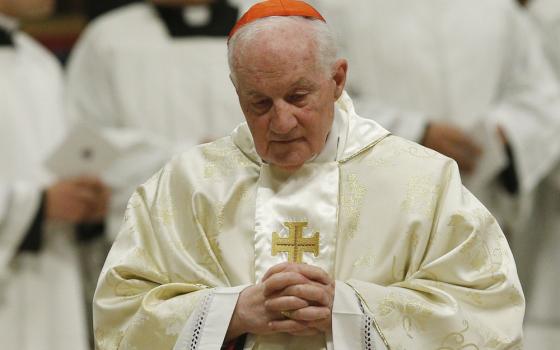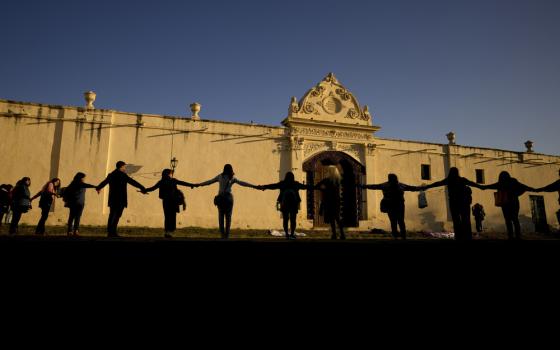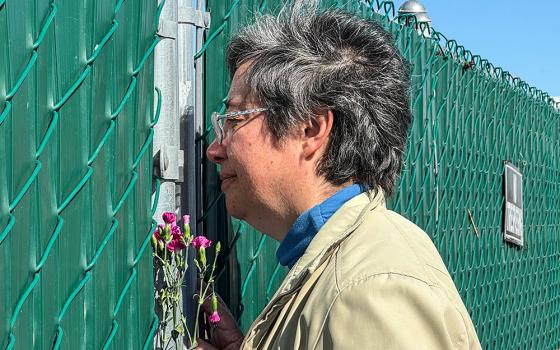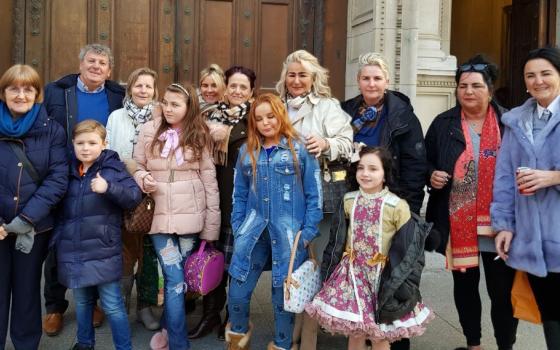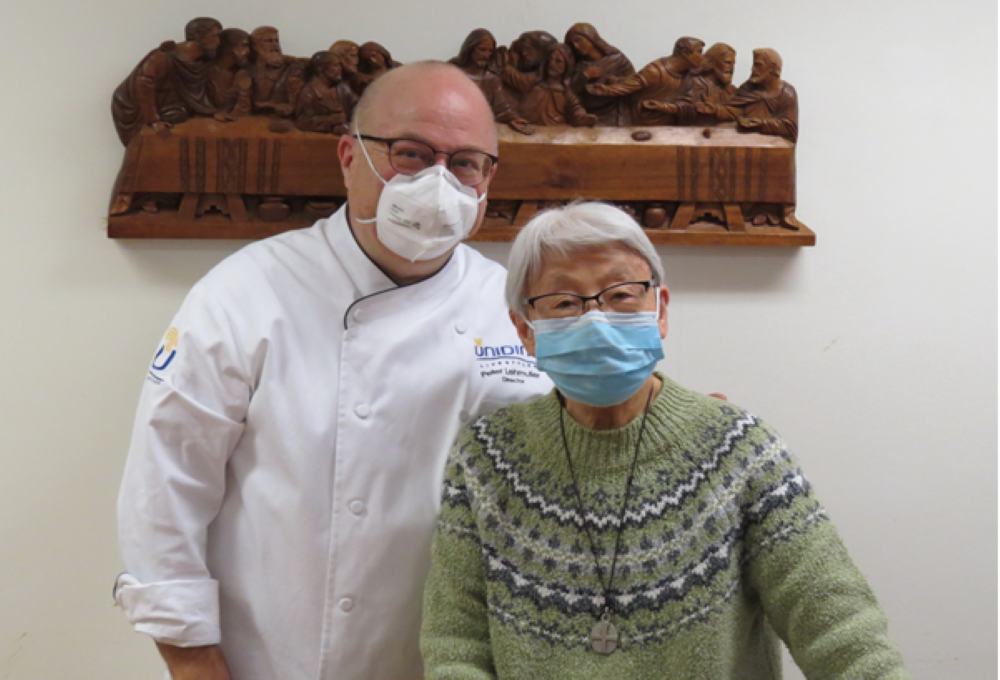
Peter Lehmuller works as chef for the Franciscan Missionaries of Mary sisters at their U.S. Province retirement center in North Providence, Rhode Island. With him is Sr. Eugenia Choi, a native of China who has lived in community's U.S. Province for over 50 years. (Ann Turbini)
Once a missionary, always a missionary! The call never ceases, even in retirement homes where old missionaries live with memories of what answering the call had been. The joy and grace of past service can be reawakened and experienced in new ways.
This happened recently at what seemed an ordinary event — the retirement of one chef and the hiring of another (Jesus has taught us with food before.)
God had a new message for me and all of us retirees, living with memories of challenges conquered or lessons learned from failure and success. We are still able to dream new dreams for today's world; we may not be physically involved, but we're supportive in thought and prayer.
As we age and find ourselves in retirement homes, we might forget that we remain missionaries until our final breath — until something challenges us to our original fervor. Recently a new window on missionary life opened, revealing new venues of mission in familiar old settings.
It began with a casual conversation with our new chef, Peter Lehmuller, when he explained why he was working with a retired community of missionary sisters: I know God wants me here, he said.
In a conversation weeks later, he repeated it, opening my eyes to the ongoing witness of the ministry of mission. I had seen his credentials — including a stint as dean of the College of Culinary Arts at Johnson & Wales University — and asked why he loves working here. He repeated: God wants me here!
I was speechless and wanted to learn more about our chef. My 25-year experience as a spiritual director sensed a deeper understanding of service. Somehow our mission service in many different countries and venues spoke to him in his culinary service to us.
Advertisement
Yes, we retired and semiretired religious women still have much to do — and are doing it! Much of our "doing" is possible because of our extra time for quiet and prayer. We don't recognize the witness/memory/sharing of our past lives that continues to speak to others — maybe not in words, but in shared memories of our past ministry — or as reflected in our very being. These shared memories, overheard by our staff, visitors, families or others who come in contact with us, describe our previous ministries and missionary activities.
It is not necessarily what we did, but where we did it and the people we served. Our goal to witness to God's love, to bring knowledge of him and his love — oh, what joy, and what privilege! The years passed too quickly, and one day, we were called home — to our home country or perhaps to a convent in the country that had become our home.
Sitting at tables in the dining room are sisters who spent years in Japan, Korea, India, Pakistan, Liberia, Ethiopia, Lebanon, Congo, Ghana, Kenya, Australia, Papua New Guinea, the Philippines … We are not always aware of how varied and rich our experiences have been — not just in terms of places, but especially because of the people and their values. These are the challenges and gifts of mission. We were teachers and professors at all levels of education: doctors, nurses, assistants, midwives, cooks, cleaners, organizers, catechists.
None of that seemed difficult or challenging; if it was strange in the beginning, it grew into the ordinary. We came to take it for granted, thanking God always for the privilege of serving his people wherever — even here, in our dining room where we thought we were being served.
My conversations with Peter were humbling: What he saw, heard or witnessed in us spoke of God and godly work and/or relationships.
In addition to the Franciscan Missionaries of Mary in this country, we are blessed as an international group to have sisters from other countries sent in mission to us in the United States. They enrich us culturally, in language and a sense of universality. Living with a rich variety of cultures is not yet the experience of most people, but our world needs it. Peter's comments reopened my eyes to a new vision of who we are to others. Our accustomed style of accommodation, foods, types of travel: small mission plane, horses, motor bikes, boats — in waters with crocodiles and snakes — and hikes of 12-18 miles between mission stations, was not unusual to us.
Peter commented on some exchanges with us. He frequently walks through the dining room, registering the thanks and appreciation, with an occasional criticism/suggestion. He notes how 80- to 90-year-old sisters beautify our 17 acres of grounds with flowers and gardens.
As we shared our support for the care of the Earth and creation, Peter shared a story from another chef: When someone suggested throwing away an unattractive cut of meat, he reminded them that the animal had given its life and that offering must be reverenced. He does this, in his yearly planning of 1,090 meals a year for 41 sisters, plus staff and other workers.
Special foods are frequently served for the celebration of national feasts, featuring dishes from the countries where the sisters are from or have served.
Peter said that he has 43,600 opportunities to disappoint those who eat in our dining room. He commented: What I am getting from being here is part of something bigger than me. It is all about love and service!! I think about all that is given me here, not about what I am missing.
One story he shared with much feeling and awe. Coming out of the storage rooms after unpacking a food delivery, he met a sister on a walker, who asked how he was. He commented that his hands and arms were tired after packing away the delivery. The sister asked for his hands, holding them gently but firmly. As she prayed with eyes closed, Peter felt strength returning and a sense of peace and wholeness; he cannot forget that experience.
Such comments from Peter about the sisters witnessing through their very being and presence of peace, awakened me to the missioning we are still doing.
The pandemic ended so much interaction that says "Franciscan community" to us. We ate alone in our rooms, missing the usual vibrant table discussion; Zoom was unsatisfactory for sisters with limited sight or hearing. During "lockdown," meals were served individually in plastic containers. Care in the placement and the colors of the food was obvious, and they were prepared with the touch of a master cook, delighting the senses as well as the taste.
Missing the shared meals gave us new appreciation of the nourishment that community had been in our lives. Community is built and fed around a table.
I remember the story of a village with two bakery shops. Although the bread at each site was equally enticing in its presentation and aroma, the people discovered that one excelled in nourishment and satisfaction when eaten. It came to be known/whispered that the baker at the more popular bodega put more love into his dough.
Peter ("God Wants Me Here") is God's gift to us. Jesus in the Eucharist feeds us with his love, and said: "Do this in remembrance of me" (Luke 22:19).
Peter knows that his children are proud of him. His wife, a school librarian, awaits his full retirement. But we hope it is not too soon: God has more to show him and us!

